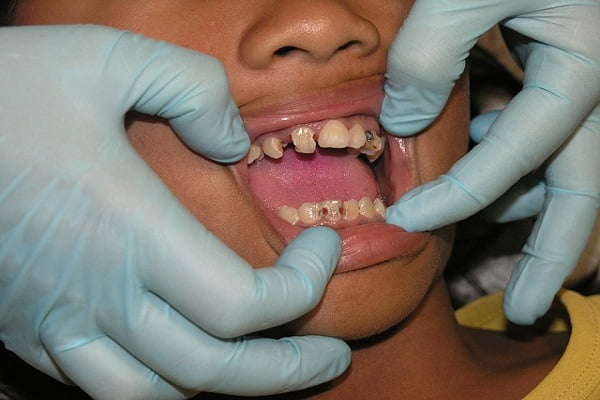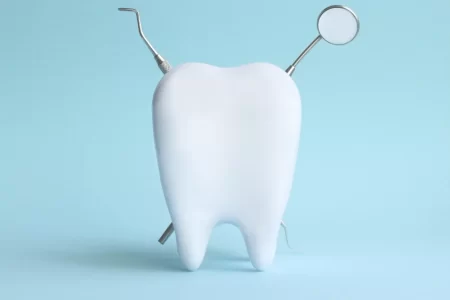What You Should Know About Bad Teeth or Ugly Teeth?
- Updated on: Jul 8, 2024
- 6 min Read
- Published on Oct 19, 2019

What are bad teeth or ugly teeth?
“Bad teeth” is not a particular disease but is a condition which arises when dental health is not taken care of well. “Bad teeth” can be referred to as periodontitis or gum infection, chronic inflammation of the tissue and structures around the teeth or decay, damage and loss of teeth mainly due to lack of oral hygiene etc. The ignorance of tooth health can lead to tooth decay, tooth infection,gum disease, etc and several other problems such as heart disease, respiratory problems, mouth ulcers leading to oral cancer or esophageal cancer, etc.
Bad teeth are basically unhealthy teeth which can be described as ugly teeth, gum related issues in teeth, infected teeth, rotten teeth, decayed teeth, impacted teeth, etc. The unappealing or ugly appearance is also a matter of concern for people. In some cases, new artificially made teeth set or veneers can be used as new teeth to get rid of the bad teeth. In some cases, excess damage in roots and gums make treatment and fixing of the bad teeth difficult.
See also: What can I do to keep cavities from forming?
See also: Diagnosis of Dental Caries
Problems caused by ugly teeth
Bad oral health can directly affect the health of a person. It also destroys the facial appearance of a person. Ugly teeth may result in teeth damage, grinded teeth, problems in chewing food, extreme sensitivity in teeth, temporomandibular joint disorders which can result in strain on the jaws, teeth and facial muscles, etc.
The main problem that occurs due to ugly teeth is related to the digestive system because either the patient cannot eat properly, or if at all he or she is able to eat, he or she is still not able to chew or grind or digest the food properly. Bad teeth not only affect the health of a person but also disturb the looks of the person. A bad teeth smile is never a pleasant view and also depicts lack of oral dental hygiene. Bad teeth often lead to bad breath which makes it uncomfortable for a person to stand in gatherings.
Major health issues that occur due to bad teeth or unhealthy teeth or bad oral health are:
- Cardiovascular Disease: To say that oral problems directly cause heart issues might not be completely true, but it is seen that there is an association between the two. Periodontal disease is sometimes related to the risk of coronary artery disease and stroke. The bacteria which cause teeth infection, periodontal disease or gum infection can, sometimes, enter into the blood stream and cause atherosclerosis. Atherosclerosis is hardening of arteries by forming plaque inside them and results in hindrance during blood flow or leads to blockage. This increases the risk of infection in the lining of heart, hyper-tension, stroke or heart attack.
- Respiratory Infections: The first symptom of bad oral health, which relate to respiratory problems, is bad breath. This indicates the beginning of lung infections and other respiratory issues. The bacteria present in the mouth, during infection in tooth or gums, can travel to the lungs and result in diseases such as bronchitis, pneumonia, emphysema, etc. Tooth infection, when enters the blood stream, also affects the respiratory system (especially lungs).
- Diabetes: It is observed that periodontal (gum) diseases or teeth infections can make diabetes more chronic and difficult to control. Also, diabetic people are more prone to suffer from gum infections which cannot be treated easily and even tend to increase the blood sugar levels in a person. Oral health problems which are more frequently observed in diabetes are dry mouth problems such as ulcers, cavities, etc., or fungal infections in mouth (thrush) etc.
- Osteoporosis: Osteoporosis is loss of bone density, which leads to weakening of bones and increase of risk of fractures. Bad teeth do not cause osteoporosis, but, during mouth infections, bacteria present in mouth tend to de-mineralize the teeth or breakdown the connective tissues and bones. These tissues and bones function to maintain the grip of the teeth and keep them attached to the surface. This often ultimately results in tooth loss due to the decrease in bone mineral density.
- Cancer: Oral or mouth cancer is a common complication which occurs due to bad teeth and worsening of oral health. Bad oral practices such as smoking, consuming tobacco, etc often lead to ulcers, ugly teeth, abscessed tooth, bad teeth, etc. Bad teeth condition also increases the risk of other cancers such as pancreatic cancer, blood cancer, kidney cancer, etc.
- Kidney Disease: Kidney infections arise in people who suffer with bad teeth or other dental problems. People with oral diseases have weak immunity, and weak bones. Oral problems lead to blockage of arteries which also affects the kidney function. Patients on hemodialysis are more prone to infections due to bad teeth problems.
- Digestive problems: Teeth and saliva play an important role in the digestion process. Chewing of food is the first step towards digestion. While chewing, the food mixes with saliva which has enzymes to break down the food. Saliva also has an important property and the enzymes in it neutralize bacterial infections in the mouth. If there is any infection in the mouth, the digestion process is disturbed. Sometimes, bad teeth or oral diseases cause a reduction in the production of saliva, irritation or inflammation in digestive tract, etc.
- Birth complications or pregnancy issues: Hormonal changes which occur during pregnancy can cause dental problems. Bad teeth or infection in gums can affect your complete body mechanism. These dental problems can cause early birth of a child in some cases, or sometimes the baby is born underweight, and sometimes the baby might lack minerals such as calcium in teeth. Gum infections increase the risk of complications in both mother and child.
More: Home remedies for tooth decay (dental cavity)
More: What You Should Know About Rotten Teeth in Children?
Signs and symptoms of bad teeth
The appearance i.e. the shape, structure or color of teeth changes if the dental health deteriorates. Discoloration of teeth and bad breath are supposed to be the first signs to mark the beginning of bad teeth. Other issues that relate to bad teeth are:
- Bad breath stays for a very long time
- Redness and tenderness in gums
- Teeth sensitivity
- Swelling and bleeding in gums
- Pain while chewing food
- Bitter taste in the mouth
- Neck glands also swell
- Strain on jaw line and face muscles
- Pain in head
- Open, draining (pus) sores on the gums
- Slowly, the teeth start clipping, cracking and breaking. Read about loose teeth.
- Fever can also occur if the infection increases
- Dry mouth (decrease in saliva production)
- Tooth decay(cavity) or tooth infections are sometimes very difficult to treat.
Causes of bad teeth
- Excess consumption of carbohydrates i.e. sugar (sucrose, fructose, etc) can result in tooth decay or cavity formation.
- Lack of nutrients such as calcium and excess use of acidic drinks such as soda results in tooth decay and deterioration of enamel.
- Bacterial attack can form acids which can result in plaque formation (yellowish coat) and teeth erosion.
- Smoking or consumption of tobacco or alcohol also increases the chances of bad teeth.
- Tooth grinding can also be a cause of bad teeth. It is observed that some people have a habit of mouth crushing or grinding their teeth without even realizing it.
- Dry mouth can lead to tooth infections as lack of saliva prevents its antibacterial action.
- Lack of oral hygiene.
- In very few cases, genes and age might be a reason which increases the chance of getting bad teeth. Often, genes play a role in dental health and dental issues. Some dental problems that can be inherited are such as deep tooth crevices and enamel issues that may result in tooth decay or cavity formation. Increasing age can result in different dental issues such as deterioration in gum condition, damage to teeth or formation of cavity, dry mouth, etc. Old age people, also, cannot take proper care of their oral hygiene which also leads to bad teeth in older people.
Fixing Ugly Teeth: Treatment and Prevention
At advanced stages, the bad teeth condition can be detected through dental X-rays. Early stage of bad teeth cannot be easily detected because tooth problems grow slowly. Pain in gums, discoloration or formation of dark spots on teeth and cavity formation are initial signs of bad teeth. Some preventive measures and treatments that may be used in fixing bad teeth are:
- Diet should be monitored. Carbohydrates and acidic foods should strictly be avoided. Fiber food, calcium and minerals, etc are best recommended.
- Using fluoride toothpaste twice a day while brushing teeth can help fix your ugly teeth. Using dental floss and mouth wash are recommended as it helps to remove plaque and bad breath.
- Alcohol and smoking should be avoided
- Antibiotics and over-the-counter medicines can be prescribed during pain or infection. Antibiotics are also given to boost immunity.
- Pus in gums can be extracted out to remove infection.
- Amalgam filling and dental crowning are prescribed to fix bad teeth during tooth decay.
- Composites or dental veneers help in maintaining the smile and looks of a person in case of damaged or decayed tooth.
- In case of severe infections, root canal treatment is recommended to save the tooth and eliminate the infection.
- Sometimes, the infected tooth needs to be exfoliated or removed due to its worsened condition so that it may not affect the nearby teeth.
Dental hygiene should not be ignored. Regular dental checkups are important as your dental health affects your overall health.












